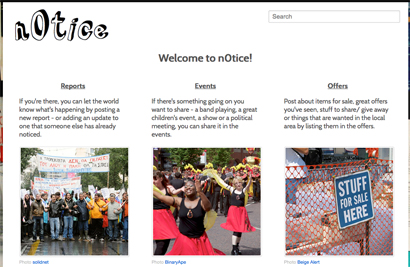Online noticeboard n0tice has today opened to all community groups and hyperlocal sites after testing the technology with a limited number of users.
Groups can now create their own customised page, choosing a domain and can start to moderate activity. The platform is still being developed but there are plans to later introduce revenue-sharing between n0tice, owned by the Guardian Media Group, and page owners, such as hyperlocal news sites and bloggers.
notice is like a cross between a village noticeboard, Gumtree and Foursquare in that it is a space for users to post small ads, local news and announcements and that information can be pushed to location-enabled mobile phones and devices. There is more on how and why n0tice was created at this link and how it will make money by charging users for promoted, location-based small ads.
Following a recent invitation roll-out, hyperlocals, bloggers and community groups can now create their n0tice page, measure performance and activity with social analytics tools, and “moderate community activity in order to encourage the kind of behaviour they want to see on their noticeboard”, Sarah Hartley, one of the team behind n0tice told Journalism.co.uk.
She added:
This service is designed to serve community groups of all shapes and sizes, active local champions and community leaders, local publishers and bloggers, interest groups and hobbyists, and anyone who wants to manage a community noticeboard. We are focused on serving UK-based community groups, but it works anywhere in the world.
The service is still in development, and we have a lot we plan to add in the near future.
For example, we will develop revenue sharing opportunities via the classified advertising platform so that noticeboard owners can earn money. We will also develop a private, restricted access community noticeboard service which will be offered for a fee.
We don’t have a date when these services will be launched, but we release new capabilities on a regular basis. You can follow @n0tice to stay in touch with the team.
Access to n0tice.com is open, but community participation is currently by invitation only. There are details on the technologies used to create n0tice here.


